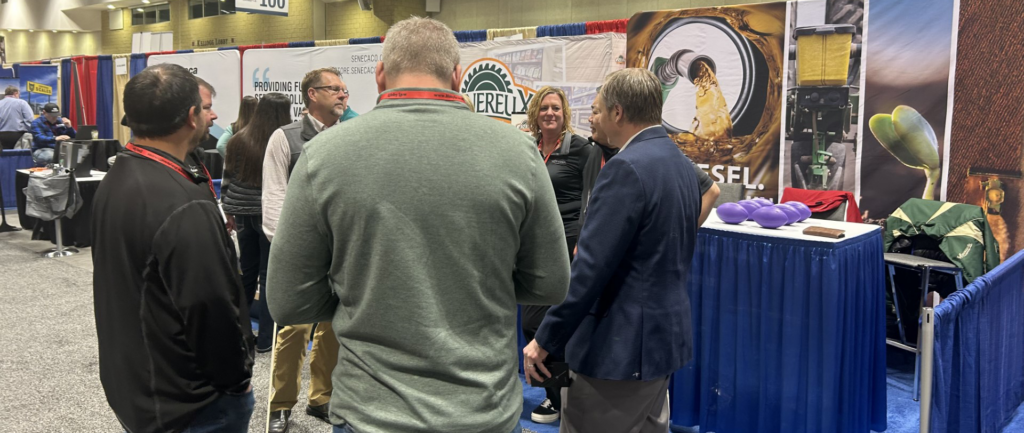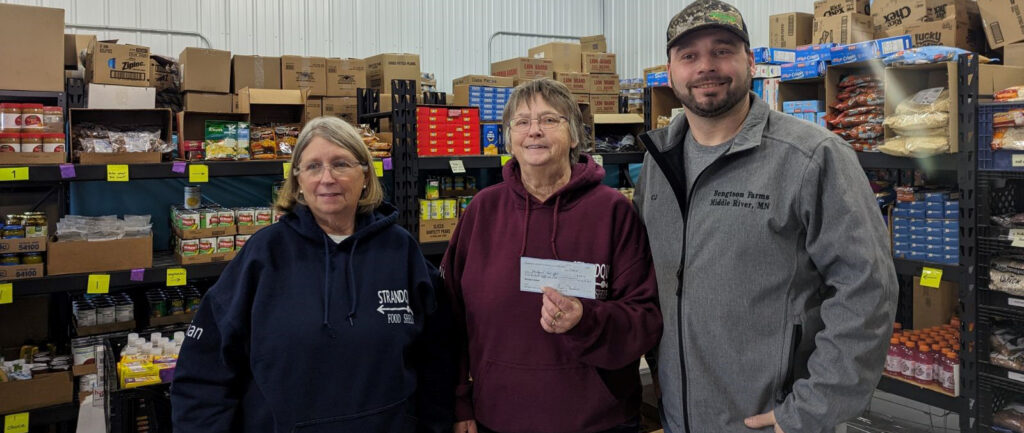This story was first featured in the May-June issue of Soybean Business. The online version can be found here.
Wally Hardie and his son, Josh, don’t run a typical farming operation. The Hardies live in North Dakota, but farm in Minnesota, South Dakota and … Africa.
Yes, Africa. In the Nampula Province to be specific, where “it feels like the last frontier on earth for agriculture,” Josh Hardie says.
But don’t expect the Hardies to pat themselves on the back. That’s not their style.
 “I just enjoy being over there so much,” Josh says.“We’ve gotten a generally positive response from people back home in the States, but until you really get over there and experience it, it’s hard to grasp.”
“I just enjoy being over there so much,” Josh says.“We’ve gotten a generally positive response from people back home in the States, but until you really get over there and experience it, it’s hard to grasp.”
The family is doing the work they love, trying to run a business and make their world a better place through better nutrition and cleaner water.
“Farming is what we take pride in, and we think it’s a very honorable profession,” Josh says from his American home in North Dakota, a few days after returning from the farm in Nampula in northern Mozambique. “Farming isn’t an easy industry, but it’s certainly a privilege to do it.”
The Hardies were first introduced to Mozambique 10 years ago, where Wally’s oldest daughter was working as a missionary nurse. Wally spent a month in Mozambique and saw possibilities in both the land and its citizens.
“We liked the people,” says Wally, who’s been farming in the States for nearly 40 years. “We put it in the back of our mind that if we could come back and farm, we would like to do that.”
The Hardies met a chicken farmer in northern Mozambique who was looking for a grower to raise soybeans for his livestock feed. The Hardies took over a bankrupt farm about five years ago, and began growing soybeans on their Deep Roots Farm. The Hardies’ goal: enriching the malnourished diets of the Mozambique people.
 “There really isn’t a commercial ag tradition at all in Mozambique, and there aren’t a lot of soybeans in the area,” Josh says. “We were starting from scratch with the local people, but it’s exciting. We saw — and still see —the potential. Ultimately, we want Africans to be feeding Africans.”
“There really isn’t a commercial ag tradition at all in Mozambique, and there aren’t a lot of soybeans in the area,” Josh says. “We were starting from scratch with the local people, but it’s exciting. We saw — and still see —the potential. Ultimately, we want Africans to be feeding Africans.”
Josh travels about 30 hours to Mozambique about four times a year. He arrives for planting season in December — most of Africa’s lingering in a drought and Mozambique sees hardly any rain from April to November. He stays for most of the winter, cultivating about 1,000 acres. He’ll be in the States helping on the family farm until about June. While he’s home in America, a team of local apprentices manage the farm in Nampula.
“When we’re planting here, we’re harvesting over there,” he says. “We’ve got a great group of guys who run the show when I’m not there. I’m more of a coach than anything.”
The Hardies report soybean yields in Nampula averaging about 20 to 30 bushels, and some as high as 40. Mozambique’s intense heat is an issue; as a result, germination and crusting are hindrances.
“You really see the value of no-till cover crops because it’s so hot,” Josh says. “Economically it’s been a big learning curve.”
The Hardies have brought their own tractors and combines to Mozambique despite South Africa’s strict border policies.
“It’s not easy to get equipment out there,” Wally says. “Every time we come over, we carry parts in our suitcases.”
The Hardies were initially aware of the locals’ suspicions of outsiders coming in for a quick buck before departing. But they’re staying for the long haul. To build a stronger rapport with the community, Josh’s wife, Sarah, started the non-profit Garden Well project in Corrane, Mozambique. Garden Well provides clean, affordable water for local villagers through drilling wells.
“We’ve really tried to up our game as far as having a good neighbor policy and positive outreach in the community,” Josh says. “And water has such an impact. Our goal is to be a catalyst to uplift the whole community and we’ve really seen a shift in the last year or so, a lot more openness.”
Josh believes his family will have to continue to reach the community beyond agriculture. “If the community looks in 10 years as it does now, we will have failed,” he says. “But things have already changed. The farm has become a rallying point for the community, and I can see in 10 years where there are farms all along the way.”
Giving Back
Al Roesler doesn’t hold any business ties to Africa per se. He’s visited Zambia in southern Africa three times on missionary trips, visiting his friend’s farm for a month at a time, and teaching the locals how to grow corn and soybeans.

“It’s not a vacation, a place I would I aim to go,” he says. “But I got lucky in choosing a place where the little bit I could contribute made a big difference. And the Africans are grateful for it.”
The average lifespan in Zambia is around 35 years. For Roesler, that reality puts matters into stark perspective when he’s back on U.S. soil.
“When you come home and you hear people complain about low interest rates for their savings accounts, you just kind of roll your eyes,” he says. “All of the things I take for granted, I have to relearn over there. That’s culture shock when you think, ‘My God, you’re on your third Zambia lifetime!’”
Roesler was raised on a farm in Waldorf, Minn., and is a longtime Farm Business Management program advisor at South Central College in Mankato. He first became interested in African agriculture after reading about Paul Webster, a Wisconsin dairy farmer who had served in the Peace Corps and was starting a demonstration farm in Congo before the political climate forced him to flee for Zambia. In Zambia, Webster’s church was granted 2,500 acres to develop a demonstration farm to teach a malnourished area how to eat a more balanced diet.
“Paul’s take was: We can better their lives but we can’t teach someone who’s hungry,” Roesler says. “So he took the ag bent to social reform.”
Roesler contacted Webster, who invited him to his farm to show the locals the rudiments of growing crops for livestock feed. He traveled alone for about a week to reach his destination. Roesler then spent a month on the 2,500-acre farm in September 2009 amid the rolling hills and valleys of Zambia, elevation 4,000 feet.
“It’s wonderful land, and it doesn’t take long to clear it,” Roesler says. “And climate-wise, it’s very interesting — at that elevation, the wind never blows.”
The rainy season, along with planting, arrives in November. Precipitation totals average around 10 inches a month through January. 12 hours of daylight is consistent throughout the year. “The soil’s about 80 degrees with all that rain if you plant it at the right time,” Roesler says. “If you’re going to raise food, you better get it planted right away in November. It grows faster than in Minnesota. You can practically hear the beans grow.”
Insects don’t pose a threat to yields, but animals of a larger variety are liable to wreak havoc on crops.
“Hippos can be a problem,” Roesler says, laughing. “I show pictures of them to my crop insurance buddies and say, ‘Adjust that!’ I mean, what are you going to do with a hippo? You can’t shoe ’em away because they’ll charge you.”
The dietary changes didn’t happen overnight, but Roesler says the natives began incorporating milk and eggs into their daily regimen. It required patience, and an understanding and appreciation of African culture.
“The first four or five years, they were skeptical,” Roesler says. “I didn’t anticipate this project growing like it has. But once the food comes along, the diet improves. Now they’re learning to raise berries, corn, soybeans, vegetables, you name it.”
Roesler forged a bond with Webster over the years, and considers the founder of Mujila Falls Agriculture Centre his best friend.
“We found out we had a lot in common and inspire each other,” Roesler says.
Roesler’s missionary efforts have also inspired members of his church.
“When the church saw what I was doing, they wanted to help and send money,” he says. “That’s a healthy thing for any congregation.”
He hasn’t been back to Zambia since 2015, but Roesler wouldn’t hesitate to make a return to the farm where the local field hands still pick corn and thrash beans by hand.
“Everyone’s working together,” he says. “These are good people who love to work, and they love to rally around. When you’ve got 25 guys, a lot can get done. It’s a big-picture type of thing.”







